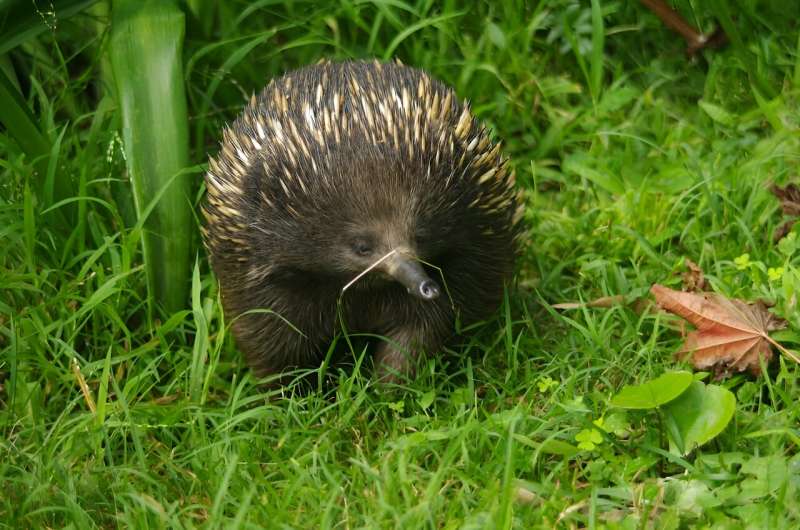This article has been reviewed according to Science X's editorial process and policies. Editors have highlighted the following attributes while ensuring the content's credibility:
fact-checked
peer-reviewed publication
trusted source
proofread
Rare echidna noises could be the 'language of love'

Curtin University researchers have captured rare recordings of echidnas cooing, grunting and making a range of other sounds, but only during the breeding season. Published in Journal of Zoology, the research is titled "Sound production by the short-beaked echidna (Tachyglossus aculeatus)."
Lead author Dr. Christine Cooper, from Curtin's School of Molecular and Life Sciences, said there had been ongoing scientific debate around the ability of echidnas to vocalize as a way of communicating or if the sounds they make are simply sniffing noises related to breathing.
"We observed wild short-beaked echidnas at Dryandra National Park, near Narrogin, Western Australia, making cooing and grunting sounds, in addition to the wheezing and exhalation noises that the animals are known to make," Dr. Cooper said.
"Our team managed to capture some of these sounds with hand-held microphones as well as a camera and microphone left unattended at the entrance to a cave popular with echidnas.
"Careful analysis of those cooing and grunting sounds showed echidnas are capable of vocalizing, aligning them with most other mammals in their use of acoustic communication.
"The echidnas made the sounds when they were alone or with another echidna, however these sounds were made only rarely, and all the vocalizations recorded occurred exclusively during the breeding season.
"So, although we don't know the purpose or understand the meaning of the short-beaked echidna's grunting and cooing, we have only heard them from adult animals during the breeding season, suggesting echidnas only find their voice when reproductively active."
Dr. Cooper said the sound recordings, along with previously reported vocalizations made by another egg-laying mammal, or monotreme, the platypus, helped resolve the scientific debate around the evolutionary timeline of when early mammals began communicating through sound.
"If both monotremes and other mammals vocalize, this suggests that the common ancestor of these two evolutionary lineages could also vocalize," Dr. Cooper said.
"While other forms of communication, such as vibrational and chemical signals, are known to have appeared much earlier, our findings confirm that acoustic communication using sound likely developed 100 to 200 million years ago and before monotremes diverged from other mammals."
More information: C. E. Cooper et al, Sound production by the short‐beaked echidna (Tachyglossus aculeatus), Journal of Zoology (2023). DOI: 10.1111/jzo.13114
Journal information: Journal of Zoology
Provided by Curtin University




















